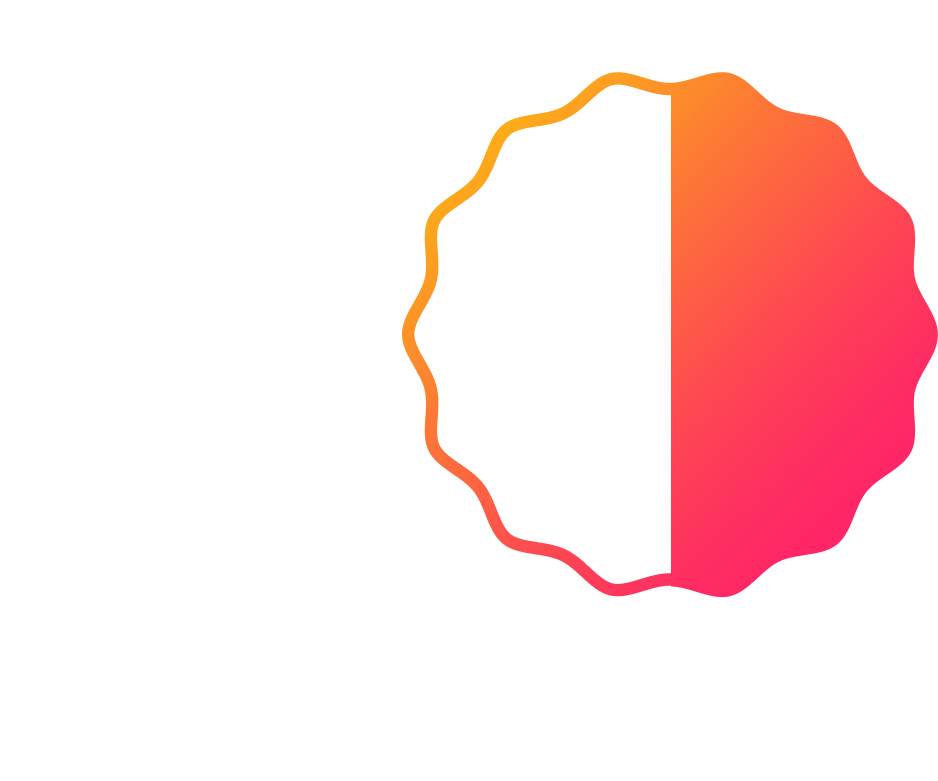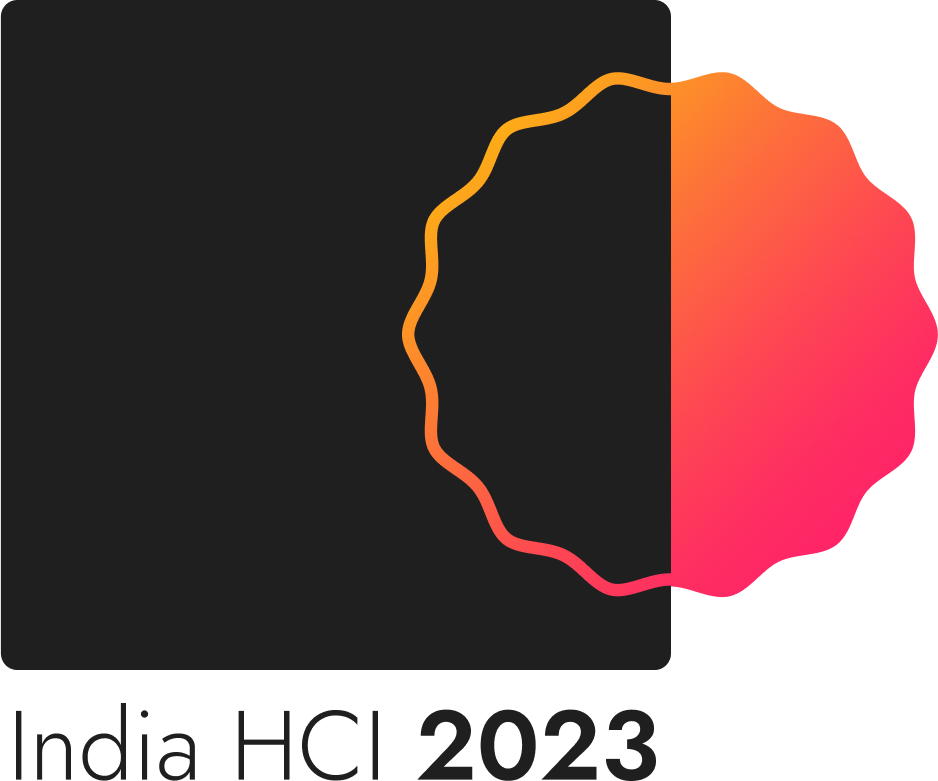Paper Chairs

Anirudha Joshi
IIT Bombay

Gavin Sim
University of Central Lancashire
Call for Papers
Extended Paper Submission Deadline (July 13, 2023) is Closed
India HCI 2023 is the 14th edition of the international conference series on Human-Computer Interaction (HCI) Design and Research. Sponsored by the HCI Professionals Association of India and in cooperation with ACM’s special interest group on computer-human interaction (SIGCHI), India HCI brings together researchers and practitioners from diverse areas that include traditional graphical & web user interfaces, tangible & ubiquitous computing, virtual & augmented reality, multimedia, new input & output devices, computer games, privacy, security, visualisation, health, accessibility and ageing, design, user modelling, engineering interactive systems, ICT for development, CSCW, and more. India HCI provides a special spotlight on papers that are relevant to South Asia, including those related to culture, language, socio-economic situations, and the industry from the region. The intimate size, single track, and comfortable surroundings make this conference an ideal opportunity to exchange research results and implementation experiences.
Accepted papers will be published in the India HCI 2023 Conference Proceedings and will be included in the ACM Digital Library.
To submit, see the India HCI Electronic Submission site.
Papers
India HCI 2023 is the 14th edition of the international conference series on Human-Computer Interaction. Papers are the main medium for conveying new research results at India HCI. Submissions are sought that describe original, unpublished work generally in the field of HCI. India HCI uses an anonymous submission process (similar to CHI) for paper submissions. Please consult the India HCI ‘23 Author’s Guide for information on the ACM Paper Format (also mentioned below) and conference policies on previous and simultaneous publications. To preserve anonymity during review, the authors must remove their names and affiliations from the manuscript. If authors have conducted relevant prior work, they must cite it appropriately, while also referring to this work in third person. Authors can revise their submissions based on the reviews they receive, prior to submitting their camera-ready manuscripts. Until the camera-readies have been checked off by the programme committee, these must be considered conditionally accepted.
Topics of relevance include but are not limited to:
The organising committee invites submissions of research papers in all areas of HCI design. This includes all dimensions, e.g., people, product, tools, processes, and industrial applications, with research results contributing
to its understanding and support. Significantly novel enabling technologies such as innovative input devices, displays, new interaction techniques, or new media that extend the boundaries of traditional interaction, such
as natural user interfaces and interactions, mixed reality, mobile interaction, computer games, health, accessibility, ageing, user modelling.
- User studies that engage qualitative research methods and/or offer critical perspectives on technology design, deployment, and/or use.
- Engineering interactive systems design, ubiquitous computing (including wearables), social software, ICT for development (ICTD), and computer-supported collaborative work (CSCW).
- Innovative user interfaces for difficult interaction contexts or challenging applications. Examples include managing large, complex information sets, usable privacy and security, multi-user interaction, crowdsourcing, automotive
user experiences and in-vehicle interactions (devices and interface automation, instrumentation evaluation, interactive systems, benchmarking driver performance and behaviour), or techniques that span devices distributed
in time and space.
- Breakthrough user experiences leveraging techniques such as machine learning, computer vision, computer graphics, speech processing, networking, or human perception and cognition (e.g., analysing driver distractions).
- Innovative software architectures, design tools, toolkits, programming systems and development environments that support the development and use of the above technologies in user interfaces.
- User studies that engage qualitative research methods and/or offer critical perspectives on technology design, deployment, and/or use.
Few research tracks details are listed below, but not limited to:
Design for User Experience and Usability
- Design methods and techniques
- Evaluation Methods and Techniques
- UX (User Experience) and User Interface Design
- HCI in Industry and Business
- Design Thinking
- Human-Centered Design and User-Centered Design
- Heuristics and Guidelines for Design
- Ergonomics/ human factors
- Psychology, Cognition, and Social Sciences
- Service Design
Design for Immersive Environment and Interactions
- Virtual reality/ Augmented reality/ Mixed reality
- Locomotion, orientation and navigation in immersive environment
- Challenges and issues with immersive environment
- Human factors
- Multimodal interactions
- Human-robot interactions and collaboration
- Gesture/ tangible/ tactile/ haptic based interaction design
- NUI (natural interaction design)
- Child-Computer interaction
Design for Art, Cultural and Humanity
- Creative art and traditional culture preservation
- Cultural differences and HCI
- Gender and HCI design
- Digital humanities
- Internationalisation, globalisation and localization
- Interface for disabled and senior people
- Interface for children and infants
HCI for Games/ Entertainment Computing/ Creative Computation
- Edutainment /Education games
- Video games
- Mobile games
- Social network games
- Multiplayer games /MMORPGs
- VR/ AR games
- Therapeutic games
- Digital games/Online games
- Game enjoyment/addiction
- Player personality, characteristics and demographics
- Gender and games
- Game and flow /Game immersion
- Creative Support Tools
- HCI for Enabling Creativity
- Interactive Art Installations
Design for Indian Knowledge System and Social Organisation
- Design methods, design models and evaluation of knowledge system
- Wellbeing, health, and education
- Digital inequality in HCI
- Information design for social cause
- Remote work and productivity
- Learning pedagogy and education system
- Social design
- Geopolitics and HCI
- HCI in Society 5.0
Design for Digital Learning and Creativity
- Creativity and HCI
- e-Learning and distant learning
- Gamification
- Collaborative and hybrid learning
- Cognitive and affective computing in design
Design for HCI Applications (not limited to)
- Smart factory
- Consumer products and experience
- Education
- Games and sports
- Entertainment and animation
- Healthcare and medical
- Automobile UI
- HCI for Creativity/ Creativity in HCI/ Creativity and HCI
- Web 3.0/ Metaverse/ AR/VR/MR/ Avatar Psychology
All papers should be submitted electronically to India HCI Electronic Submission site by July 13, 2023.
Paper Length
To be considered Full Papers, contributions should be more than six pages long (single column template). There is no hard page limit, but long papers without a proportional contribution are more likely to be rejected. Previous papers (if converted to the new ACM single-column format) would have run 14-18 pages in length.
Videos
Videos accompanying submissions can be submitted through the India HCI EasyChair Electronic Submission Site as supplementary material (max 100 MB in size). Although papers must stand on their own, submitted videos will be available to reviewers as supporting material. Authors should note that no specific guidelines are given for developing a video. Videos are viewed only as supporting material, and authors of accepted papers will have the opportunity to prepare a more polished final video presentation for inclusion in the proceedings and as supplemental material in the ACM Digital Library. Authors should note that videos too need to maintain anonymity for the review process. Authors are free to update the video once their submission is accepted, if they wish to disclose themselves in the videos.
When submitting your video for review, please encode your video in a format that works across as many platforms as possible without the installation of additional codecs. Please note that the total aggregate size for a submission must not exceed 100 MBytes (including all documents and additional material).
Reviewing Process
Each paper will be subjected to rigorous review by two Associate Chairs (from the programme committee) and two external reviewers (experts in the area that are not on the committee). Contact authors will be sent the initial reviews for their papers by August 9, 2023. Authors will have an opportunity to submit a 500-word rebuttal to answer questions or clarify misunderstandings of reviewers by August 16, 2023. The final decision for accepting or rejecting a paper will be done in a PC meeting, after which the authors will be notified of the decisions by August 25, 2023.
All acceptances will be conditional pending changes that the papers committee may suggest or require for the final camera-ready draft of the paper. The primary author of each accepted paper will receive detailed instructions on how to submit a final, publication-ready version of the paper. The paper will not be formally accepted to India HCI until authors revise it and submit a final draft for approval by the programme committee. Some submissions may be asked to undergo a more intense shepherding process in order to bring them to the standard required for India HCI. The deadline for submitting the “camera ready” version after all changes will be September 30, 2023. Additionally, at least one author of each paper needs to register for the conference by this date.
Associate Chairs
- Dipanjan Chakraborty, BITS Pilani, Hyderabad Campus
- Jyoti Kumar, IIT Delhi
- Malay Dhamelia, IIT Bombay
- Siddharth Gulati, University of Manchester
- Pranjal Borah, IIT Guwahati
- Abhishek Shrivastava, IIT Guwahati
- Pushpendra Singh, IIIT Delhi
- Wricha Mishra, MIT ADT University
- Nimmi Rangaswamy, IIT Hyderabad
Reviewers
- Pallavi Rao, IIT Bombay
- Pradeep Yammiyavar, IIT Guwahati
- Susmita Sharma, IIT Bombay
- Rosa Arriaga, Georgia Tech
- Manjiri Joshi, Swansea University
- Vijayanand Banahatti, Tata Consultancy Services
- Saurabh Srivastava, Google
- Mohit Jain, Microsoft Research
- Advait Bhat, Microsoft Research
- Khyati Priya, IIT Bombay
- Swati Pal, IIT Bombay
- Deepak Ranjan Padhi, IIT Bombay
ACM Paper Format
All authors should submit manuscripts in the ACM Paper Format using Microsoft Word Template, LaTeX Template, or Overleaf. [Please note that the Microsoft Word Template contains invisible meta-tags related to the paper format and structure. While writing the paper, authors are requested to add their content without altering any format and structure of the template.]
Authors’ Guide
Important Dates
- July 13, 2023: Papers due (extended)
- August 9, 2023: Authors will receive initial reviews of their papers
- August 16, 2023: Rebuttals due
- August 25, 2023: Authors will be notified of the decision and get final reviews
- September 17, 2023: Paper needing shepherding decisions
- September 30, 2023: Final camera-ready papers are due, and at least one author must register for the conference
(All deadlines close at 23:59 IST)



